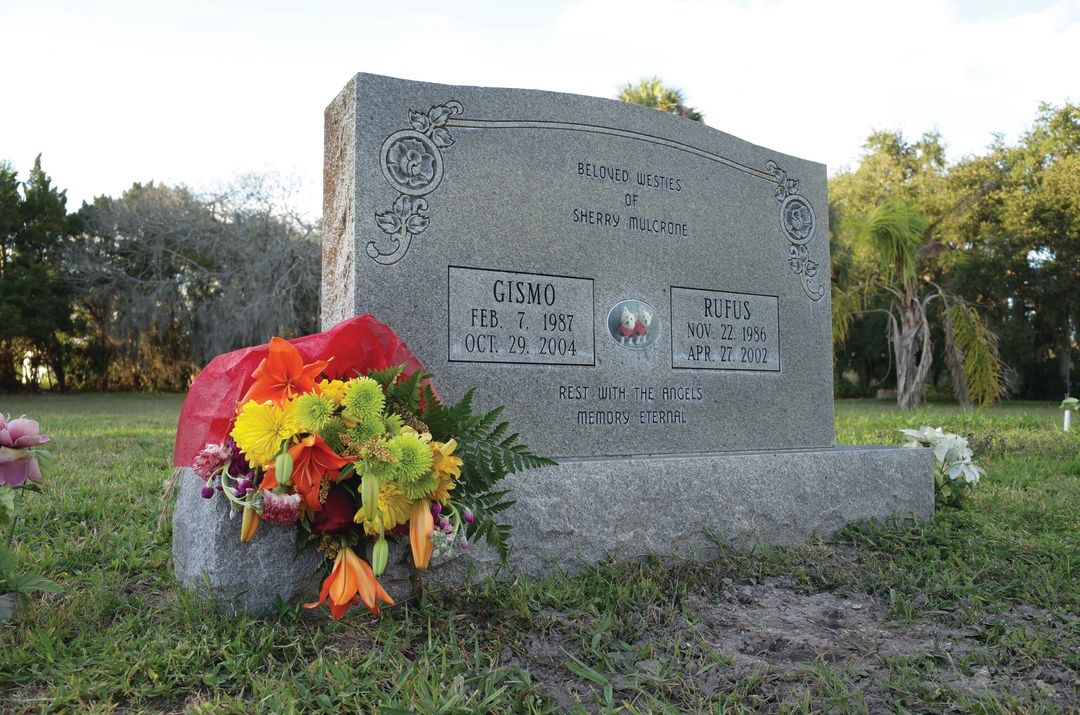The Sweet Sadness of Manatee County's Companions Pet Cemetery

A gravestone at Companions Pet Cemetery.
Image: Isaac Eger
The rows between graves are narrow at Companions Pet Cemetery in Rubonia, an old farming community in north Manatee County. On either side, plaques of marble, stone and tile memorialize Butterscotch, Muffy and Finnegan de Jesus.
I tiptoed down the rows, careful not to disrespect the 300 tiny bodies buried there or upset the fire ant hills erupting everywhere. It wasn’t always clear what kind of animal was underground, but by the inscriptions on the plaques, most seemed to be dogs and cats, with a few rabbits and a pair of skunks.
The earliest grave I could find was that of “Darling Dolly Ward” born 1973, interred 1986. That was about the time the cemetery was founded by Bill Woodson, whose family owned the land. Today it’s owned by Honor Thy Pet, based in Tampa, and is one of about 700 pet cemeteries in the country, according to an estimate by the International Pet Cemeteries Association.
Shawn Yebba is the executive director. His family bought the cemetery from Woodson about 10 years ago. “Pet cemeteries aren’t a busy business,” says Yebba. “We do about one to two burials per month.”
Pet burials are nothing new. Wealthy ancient Egyptians buried their pets with them. But for most of human history, domesticated animals were kept for utility, not sentiment. As our collective wealth has grown, so has our need for leisure activities and, perhaps, companionship. Today, even middle-class people live in more luxury than the pharaohs, so why not dote on our pets? China, for example, is experiencing an explosion in dog owners. The 2017 movie A Dog’s Purpose (which was criticized for animal abuse during filming) flopped in the U.S., but its popularity and profitability in China are enough that it’s being made into a sequel.
The sad part of pet ownership is that they usually die before us, and something needs to be done with the body. Ninety-nine percent of pet funerals are cremation, according to the Pet Loss Professionals Alliance, but that doesn’t mean 99 percent of all pets are cremated. No one knows how many people bury pets under their orange tree at home. (Florida statutes allow us to bury our pets in our back yards so long as the grave is at least two feet deep). If you don’t cremate or bury your pet, there’s a chance Fido could be sent to a rendering plant, repurposed into a macabre gruel to feed, of all things, other pets.
Burials at Companions Pet Cemetery start at just under $1,000. A small chapel is available if people want a service; the Yebbas don’t provide a pastor, but respect all denominations. “Just like I can’t accept that there’s nothing left for man after life,” says Yebba, “I can’t accept that there’s nothing for animals.”
To Yebba and his customers, pets are like children, although maybe better. “Obviously we love our human children,” he says, “but with our pets it’s a different kind of love. I am blessed with four daughters, but when I come home every day from work it’s my Chihuahua who greets me.”
Many stones refer to pets as “My baby boy,” “My little girl” and “precious baby” and say how much mommy and daddy miss them. One of the most recent stones had the name Cleopatra. Below it read, “If love could have saved you, you would have lived forever.”
I found a stone with the name “Trouble,” the same as the little white Maltese of billionaire hotel magnate Leona Helmsley, who once owned a hotel in Sarasota. Her Trouble is not buried here, but lived out its life in decadence in Sarasota after Helmsley wrote her family out of the will and left $12 million to the dog.
Helmsley might sound eccentric, but quite a few local attorneys set up pet trusts for their clients. “I might do a half dozen a year,” says Sarasota attorney Cindy Clark. One couple disinherited their daughter because she refused to take care of their dog when they die, she says. They’re leaving all their money to a local shelter to take care of the animal.
“There’s a lot of friction in families,” Clark adds. “With pets, it’s unconditional love. With your real children, [love] can be challenging.”
The largest headstone was inscribed with two names: Dante and Aichan Devito. James Devito, their owner, who visits regularly from his home in Clearwater, had recently left a chew toy and a conch on the grave. He almost had Dante the Doberman cremated, but then he saw the crematory oven and changed his mind. Aichan, his cat, once saved his life from a kitchen fire when she woke him up.
“I think she died from heartbreak after Dante,” Devito says. “I don’t have any kids, so my pets are like children. I have a beagle named Cole now. He’s in a wheelchair.”
I asked Devito if he thought his animals had a soul. He told me he was a Catholic, so he took it upon himself to baptize Dante and Aichan. “It sounds a little farfetched, but just in case they need to get into heaven,” he says.
Even as the sun set and a chill fell, the quiet field of graves did not feel haunted. Sad, yes, but uncomplicated. Ghosts stick around to settle scores. There are no debts to be squared for cats and dogs before their eternal rest.



